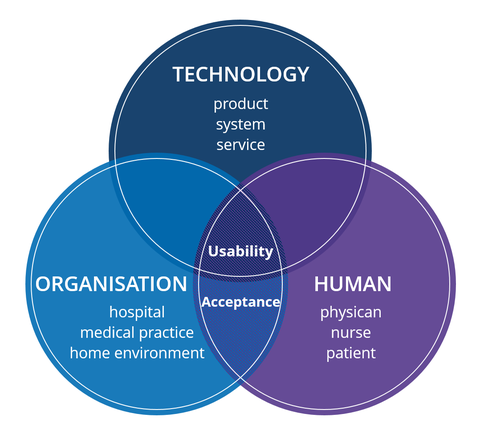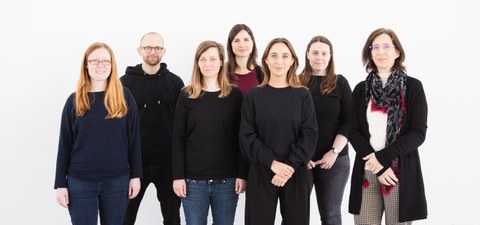B. Sedlmayr Lab: Usability & Technology Acceptance
Vision
"We strive to improve the acceptance and use of innovative health IT solutions. To this end, we create concepts, methods & tools to enable developers and researchers to develop health IT solutions tailored to the respective users, the specific work tasks and the specific working environment."
New information and communication technologies in the healthcare sector, such as artificial intelligence and big data technologies, offer many opportunities for new applications and systems. However, the success of such developments depends on how they are perceived and accepted by humans.
If clinical applications and systems are not designed in a user-friendly way, this can lead to the rejection of such innovations or cause operating problems which, in the worst case, can jeopardize patient health. Usability is therefore an integral part of the medical device development process. However, a high level of usability is no guarantee for the success of a development: Whether solutions are used by the end user at all depends largely on their acceptance. It is therefore important to identify obstacles and barriers to later acceptance of the developments in the run-up to implementation and to derive appropriate strategies to avoid potential rejection of the use of the applications and systems in everyday clinical practice.
In the interdisciplinary research area “Usability and Technology Acceptance”, human factors experts, psychologists, media technologists, media communication experts, sociologists and health scientists are therefore working on solutions that enable efficient interaction between humans and clinical systems. The focus is on developing needs-based concepts and evaluating the usability and acceptance of technical solutions.
At the center of the work is a systems engineering approach that takes equal account of the end user, the technology used and the work processes. Concepts and methods are always researched in a participatory manner with the involvement of medical staff, patients and decision-makers to ensure that the results obtained sufficiently incorporate the perspectives and working methods of the different groups.
Research areas
Central research topics of the department are
Usability research:
- Usability engineering methods for clinical applications and systems
- Concepts for context-sensitive decision support
- Interface concepts for the explainability of artificial intelligence (AI)
- Visualizations for clinical decision support systems
Acceptance research:
- Theoretical models and empirical evaluation of technology acceptance
- Diversity-sensitive measurement instruments
- Concepts and materials for strengthening digital (health) skills
Selected projects
- AMPEL – Scaling of Clinical AI Support - Project management of the Dresden site and support in the user-centred design of the clinical decision support system
- MiHUB — Medical Informatics Hub
- MIRACUM-Junior Research Group CDS2USE - Prospective user-oriented design of clinical decision support systems in the context of personalized medicine
- Networking MII-JRG — Networkingproject of the MII-Junior Research Groups
- PM4Onco — Personalized Medicine for Oncology - Support in the implementation of cross-sectoral patient flows through the increased use of digitalization (work package 3 "Patient Journey")
Courses offered
- Complex practical course “Medical Informatics : Medical Decision Support Systems" in the
Master/Diploma program in Computer Science at the Technical University of Dresden
Group leader
 © MF/Stephan Wiegand
© MF/Stephan Wiegand
Group leader
NameMs PD Dr. rer. biol. hum. habil. Brita Sedlmayr
Send encrypted email via the SecureMail portal (for TUD external users only).


